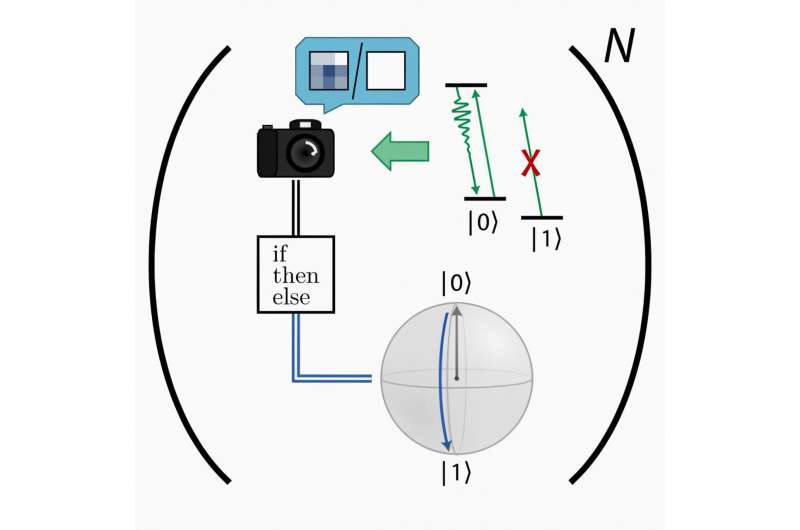This article has been reviewed according to Science X's editorial process and policies. Editors have highlighted the following attributes while ensuring the content's credibility:
fact-checked
peer-reviewed publication
trusted source
proofread
Nondestructive measurement realized in ytterbium qubits, aiding scalable neutral atom quantum computing

Atoms of the metal ytterbium-171 may be the closest things in nature to perfect qubits. A recent study shows how to use them for repeated quantum measurements and qubit rotations, which may aid in the development of scalable quantum computing.
Physicists at the University of Illinois Urbana-Champaign have developed a procedure for measuring ytterbium-171 qubits that preserves them for future use. As the researchers report in the journal PRX Quantum, achieving this "nondestructive measurement" allowed them to use the processor for long, multistage calculations that underpin many quantum algorithms.
"Ytterbium-171 has emerged as a very promising candidate for quantum computing in the last couple of years," said William Huie, the study's lead author. "And now that we've demonstrated nondestructive measurement and qubit rotations, we've shown that arrays of ytterbium atoms show promise for certain classes of quantum computing operations."
Of the many quantum computing platforms that are currently being explored, arrays of neutral atoms like ytterbium are one of the most promising. They are straightforward to scale to large system sizes, and, as they use naturally occurring atoms, there are fewer hardware and manufacturing concerns. However, certain types of atoms are more difficult to use because they have a complex level structure.
"Quantum computing is based on qubits—basically quantum systems with two accessible levels," said Jacob Covey, a U. of I. physics professor and the project lead. "However, for all their advantages, atoms can have dozens of accessible levels. It can be quite challenging to ensure that you're working with only two levels at a time."
Ytterbium-171 has attracted attention in recent years because it only contains two accessible quantum levels when cooled to its lowest-energy state. So, an operation on the atoms is far less likely to knock it out of the desired two-level qubit state, making nondestructive measurement much easier.
"But, perhaps a bit counterintuitively, these properties that are very nice for quantum operations come at the expense of a far more complicated overall structure in the atom," Covey said. "We and other groups working with ytterbium and other alkaline earth-like atoms have had to redevelop many of the now-standard techniques in atomic physics to handle its complications."
The researchers report that they achieved nondestructive measurement of ytterbium-171 qubits with a 99% success rate. They demonstrate the capabilities of their system by implementing a technique known as real-time adaptive control, in which a classical computer is used to control the ytterbium qubits based on measurement outcomes.
"Algorithms based on qubits that are externally controlled by classical computers have started to gain traction in quantum information science," Huie said. "The community is finding that measuring and controlling qubits at intermediate stages of a calculation can create large-scale quantum behavior much more efficiently in some scenarios. So, looking ahead, our group is excited to use our ytterbium platform to explore these newer developments."
More information: William Huie et al, Repetitive Readout and Real-Time Control of Nuclear Spin Qubits in 171Yb Atoms, PRX Quantum (2023). DOI: 10.1103/PRXQuantum.4.030337
Journal information: PRX Quantum





















